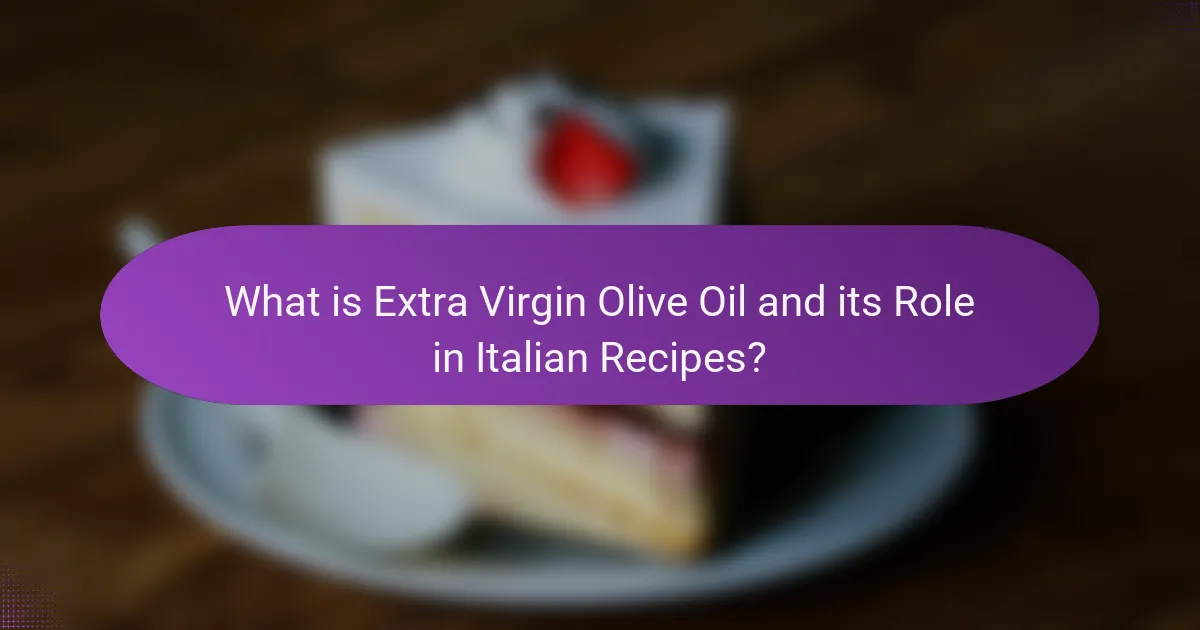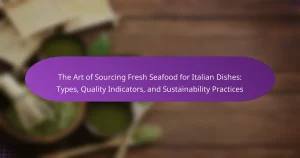
What is Extra Virgin Olive Oil and its Role in Italian Recipes?
Extra virgin olive oil is a high-quality oil made from the first cold pressing of olives. It is characterized by its low acidity, typically below 0.8%. This oil is rich in antioxidants and healthy fats, making it beneficial for heart health. In Italian cuisine, extra virgin olive oil is essential for flavoring, cooking, and dressing dishes. It enhances the taste of salads, pasta, and grilled vegetables. Additionally, it is used as a finishing oil to add depth to various recipes. Its role in Italian recipes is both functional and cultural, symbolizing the Mediterranean diet. The oil is often sourced from specific regions in Italy, such as Tuscany and Puglia, known for their high-quality olives.
How is Extra Virgin Olive Oil produced?
Extra Virgin Olive Oil is produced through a process called cold pressing. This method involves harvesting olives at their peak ripeness. The olives are then washed and crushed into a paste. The paste is mixed to facilitate oil extraction. After mixing, the oil is separated from the solid parts using a centrifuge. This oil must meet specific chemical criteria to be classified as extra virgin. It should have less than 0.8% acidity and no defects in flavor. Quality is often assessed through taste panels and chemical analysis.
What are the key steps in the extraction process of Extra Virgin Olive Oil?
The key steps in the extraction process of Extra Virgin Olive Oil are harvesting, washing, crushing, malaxation, extraction, and storage. Harvesting involves picking ripe olives from the trees. Washing removes dirt and leaves from the olives. Crushing breaks down the olives into a paste. Malaxation mixes the paste to help release oil. Extraction separates oil from the paste using mechanical methods. Finally, storage involves keeping the oil in a cool, dark place to maintain quality. Each step is crucial for ensuring the oil’s flavor and health benefits.
What distinguishes Extra Virgin Olive Oil from other types of olive oil?
Extra Virgin Olive Oil is distinguished by its production process and quality standards. It is made from pure, cold-pressed olives without any chemical treatment. This oil must have an acidity level of less than 0.8%. It also undergoes strict sensory evaluation to ensure it meets taste and aroma criteria. In contrast, other types of olive oil may contain refined oil or have higher acidity levels. Extra Virgin Olive Oil retains more antioxidants and nutrients due to its minimal processing. Studies show it has a higher concentration of polyphenols, contributing to its health benefits. These factors collectively set Extra Virgin Olive Oil apart from other olive oil varieties.
Why is Extra Virgin Olive Oil significant in Italian cuisine?
Extra Virgin Olive Oil is significant in Italian cuisine due to its flavor and health benefits. It serves as a primary fat source in many traditional dishes. The oil enhances the taste of vegetables, meats, and sauces. Extra Virgin Olive Oil is rich in monounsaturated fats and antioxidants. Studies show it can lower the risk of heart disease. Its production is tied to Italian culture and history. Regions like Tuscany and Calabria are renowned for high-quality olive oil. The oil is also used in dressings and marinades, showcasing its versatility.
How does Extra Virgin Olive Oil enhance the flavor of Italian dishes?
Extra Virgin Olive Oil enhances the flavor of Italian dishes by adding richness and depth. Its unique taste profile includes fruity, peppery, and sometimes bitter notes. These characteristics complement various ingredients in Italian cuisine. The oil’s high polyphenol content contributes to its flavor complexity. Additionally, it can elevate the taste of both raw and cooked dishes. Studies show that using high-quality Extra Virgin Olive Oil improves overall dish satisfaction. It also helps in flavor extraction during cooking, making ingredients more pronounced. Thus, it is a key component in achieving authentic Italian flavors.
What traditional Italian recipes prominently feature Extra Virgin Olive Oil?
Traditional Italian recipes that prominently feature Extra Virgin Olive Oil include Bruschetta, Pesto, and Caprese Salad. Bruschetta consists of toasted bread topped with tomatoes, basil, and olive oil. Pesto is a sauce made from basil, garlic, pine nuts, Parmesan cheese, and olive oil. Caprese Salad combines fresh mozzarella, tomatoes, basil, and a drizzle of olive oil. These recipes highlight the flavor and health benefits of Extra Virgin Olive Oil. Its use is essential in many Italian dishes, enhancing taste and nutrition.
What are the health benefits of Extra Virgin Olive Oil?
Extra virgin olive oil offers numerous health benefits. It is rich in monounsaturated fats, which support heart health. Studies show that it can reduce the risk of cardiovascular diseases. Extra virgin olive oil also contains antioxidants, such as vitamin E and polyphenols. These compounds help combat oxidative stress and inflammation in the body. Research indicates that regular consumption may lower blood pressure. It can also improve cholesterol levels by increasing HDL (good cholesterol). Additionally, it may enhance brain health and reduce the risk of neurodegenerative diseases.
How does Extra Virgin Olive Oil contribute to heart health?
Extra Virgin Olive Oil contributes to heart health primarily through its high content of monounsaturated fats. These fats help reduce bad cholesterol levels, lowering the risk of heart disease. Additionally, Extra Virgin Olive Oil is rich in antioxidants, such as vitamin E and polyphenols. These compounds protect blood vessels from damage and reduce inflammation. Research indicates that a Mediterranean diet, which includes Extra Virgin Olive Oil, is associated with a lower incidence of cardiovascular events. A study published in the New England Journal of Medicine found that participants consuming Extra Virgin Olive Oil had a 30% reduced risk of heart disease. This evidence supports the role of Extra Virgin Olive Oil in promoting heart health effectively.
What antioxidants and nutrients are found in Extra Virgin Olive Oil?
Extra Virgin Olive Oil contains several antioxidants and nutrients. Key antioxidants include oleocanthal, oleuropein, and hydroxytyrosol. These compounds contribute to its anti-inflammatory properties. Nutrients found in Extra Virgin Olive Oil include vitamin E and vitamin K. Vitamin E acts as an antioxidant, protecting cells from damage. Vitamin K plays a crucial role in blood clotting and bone health. The presence of monounsaturated fats also supports heart health. Research indicates that these components contribute to the health benefits associated with Extra Virgin Olive Oil consumption.

Where is Extra Virgin Olive Oil sourced from?
Extra Virgin Olive Oil is primarily sourced from Mediterranean countries. Key producers include Italy, Spain, Greece, and Tunisia. Italy is renowned for its high-quality extra virgin olive oils. The country has diverse regions, each producing distinct flavors. Spain is the largest producer of olive oil globally. Its extensive olive groves contribute significantly to the market. Greece is known for its rich, fruity oils, often produced from native olive varieties. Tunisia has been increasing its production and export of olive oil in recent years. These regions provide optimal climate and soil conditions for olive cultivation.
What are the primary regions known for producing Extra Virgin Olive Oil?
The primary regions known for producing Extra Virgin Olive Oil include Italy, Spain, Greece, and Tunisia. Italy is renowned for its diverse varieties, particularly from Tuscany and Puglia. Spain is the largest producer, with Andalusia being a significant area for olive cultivation. Greece is famous for its high-quality oils, especially from Crete and Kalamata. Tunisia has also emerged as a key player in the olive oil market. These regions benefit from ideal climates and traditional cultivation methods, contributing to the unique flavors and qualities of their oils.
How do the geographical conditions affect the quality of Extra Virgin Olive Oil?
Geographical conditions significantly affect the quality of Extra Virgin Olive Oil. Factors such as climate, soil type, and altitude play crucial roles. Warm temperatures promote olive ripening, while cooler nights enhance flavor. Soil composition influences nutrient availability and oil composition. Regions with well-drained soils produce healthier olive trees. Altitude can impact temperature variations, affecting the oil’s flavor profile. Studies show that olives from coastal regions often have distinct taste characteristics due to maritime climate influences. Additionally, local farming practices and traditional methods can further enhance oil quality.
What are the most famous Italian regions for Extra Virgin Olive Oil production?
The most famous Italian regions for Extra Virgin Olive Oil production are Tuscany, Puglia, and Liguria. Tuscany is renowned for its high-quality oils with a fruity and peppery flavor. Puglia is the largest producer, contributing about 40% of Italy’s olive oil. Liguria is known for its unique Taggiasca olives, offering a distinct taste. Other notable regions include Calabria and Sicily, both celebrated for their exceptional oils. Each region’s climate and soil contribute to the unique flavor profiles of their oils.
How is the quality of Extra Virgin Olive Oil assessed?
The quality of Extra Virgin Olive Oil is assessed through sensory evaluation and chemical analysis. Sensory evaluation involves trained panels tasting the oil to detect flavors and aromas. They look for positive attributes like fruitiness and bitterness. They also identify defects such as rancidity or fustiness. Chemical analysis measures specific parameters, including acidity and peroxide levels. A free acidity of less than 0.8% is required for classification as Extra Virgin. Additionally, the oil must have a peroxide value below 20 meq O2/kg. These assessments ensure the oil meets quality standards set by organizations like the International Olive Council.
What indicators determine the quality of Extra Virgin Olive Oil?
The quality of Extra Virgin Olive Oil is determined by several key indicators. These include acidity levels, which should be less than 0.8% for high-quality oils. The oil’s flavor profile is also crucial; it should exhibit a balance of fruitiness, bitterness, and pungency. Freshness is another indicator; the best oils are made from olives harvested within the last year.
The extraction process matters as well; cold-pressed methods preserve flavor and nutrients. Chemical analyses, such as the presence of polyphenols, indicate health benefits and quality. Lastly, certification from recognized organizations can validate the oil’s quality and origin. These indicators collectively ensure the oil meets high standards for taste and health benefits.
How can consumers identify high-quality Extra Virgin Olive Oil?
Consumers can identify high-quality Extra Virgin Olive Oil by checking for specific attributes. Look for the “Extra Virgin” label, which indicates the highest quality. Verify the harvest date on the bottle; fresher oil has better flavor and health benefits. Examine the packaging; dark glass bottles protect oil from light degradation. Consider the origin; reputable oils often specify a region or estate. Taste the oil; high-quality varieties have a fruity, peppery flavor and a slight bitterness. Check for certifications like PDO (Protected Designation of Origin) or organic labels, which ensure quality standards. Lastly, read reviews or ratings from trusted sources to confirm the oil’s reputation.

How can you incorporate Extra Virgin Olive Oil into your cooking?
Use Extra Virgin Olive Oil as a dressing for salads. It enhances flavor and adds health benefits. Drizzle it over vegetables before roasting. This method preserves nutrients and adds richness. Incorporate it into marinades for meats and fish. This improves tenderness and infuses flavor. Use it for sautéing vegetables at low to medium heat. This retains the oil’s health properties. Add it to pasta dishes for a finishing touch. This elevates the dish with a fruity aroma. Use Extra Virgin Olive Oil in baking as a substitute for butter. This can create moist textures in baked goods.
What are some best practices for using Extra Virgin Olive Oil in recipes?
Use Extra Virgin Olive Oil (EVOO) as a finishing oil for flavor enhancement. Drizzling EVOO over dishes like salads or grilled vegetables maximizes its taste. Use it for low to medium-heat cooking to preserve its health benefits. High temperatures can degrade its quality. Pair EVOO with acidic ingredients, such as vinegar or citrus, to create balanced dressings. Store EVOO in a cool, dark place to maintain its freshness. Choose high-quality, certified EVOO for the best flavor and health properties. Look for harvest dates on the bottle to ensure freshness.
How should Extra Virgin Olive Oil be stored for optimal freshness?
Extra virgin olive oil should be stored in a cool, dark place. Exposure to light and heat can degrade its quality. A pantry or cupboard is ideal for storage. The oil should be kept in a tightly sealed container. Glass bottles or dark metal tins are preferred. These containers protect the oil from oxidation. It is best to avoid plastic bottles, as they can leach chemicals. Proper storage can extend the oil’s freshness for up to two years.
What tips can enhance the use of Extra Virgin Olive Oil in Italian dishes?
Use Extra Virgin Olive Oil as a finishing touch to enhance flavor. Drizzle it over pasta or salads just before serving. This preserves its delicate taste and nutritional properties. Incorporate it into dressings for a rich, robust flavor. Combine it with vinegar or lemon juice for a balanced dressing. Use it to sauté vegetables at low to medium heat. High temperatures can degrade its quality. Pair it with fresh herbs to elevate dishes. Basil, oregano, and rosemary complement Italian cuisine well. Store Extra Virgin Olive Oil in a cool, dark place to maintain its quality. Proper storage prevents oxidation and rancidity.
Extra Virgin Olive Oil is a high-quality oil derived from the first cold pressing of olives, known for its low acidity and rich antioxidant content, making it a staple in Italian cuisine. The article explores its production process, key regions of sourcing, and the health benefits associated with its consumption, particularly in relation to heart health. It also highlights how Extra Virgin Olive Oil enhances the flavor of traditional Italian dishes and provides indicators for assessing its quality. Additionally, best practices for incorporating this oil into cooking and tips for optimal storage are discussed.


